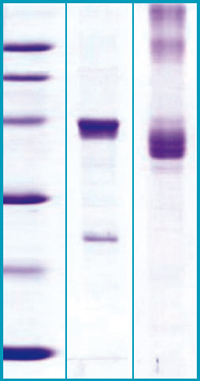Soluble Advanced Glycation End Product-Specific Receptor Human E. coli
The receptor for advanced glycation end products (RAGE) is a multiligand member of the immunoglobulin superfamily of cell surface molecules. It mediates interactions of advanced glycation end products (AGE), the products of nonenzymatic glycoxidation of proteins/lipids that accumulate in the plasma and tissues of patients with diabetes.
Research topic
Diabetology – Other Relevant Products, Neural tissue markers, Renal disease
Type
Recombinant
Description
Total 339 AA. MW: 36.5 kDa. UniProtKB acc.no. Q15109. N-Terminal His-tag 14 AA (highlighted).
Source
E. coli
Purity
>95%
SDS-PAGE Gel
12% SDS-PAGE separation of Human sRAGE
1. M.W. marker – 14, 21, 31, 45, 66, 97 kDa
2. reduced and heated sample, 5μg/lane
3. non-reduced and non-heated sample, 5μg/lane
Endotoxin
< 1.0 EU/ug
Formulation
Filtered (0.4 μm) and lyophilized in 0.5 mg/mL in 0.03 M Acetate buffer, pH=4.0
Reconstitution
Add 0.1 M Acetate buffer pH4 to prepare a working stock solution of approximately 0.5 mg/mL and let the lyophilized pellet dissolve completely. For conversion into higher pH value, we recommend intensive dilution by relevant buffer to a concentration of 10 μg/mL. In higher concentrations the solubility of this antigen is limited. Filter sterilize your culture media/working solutions containing this non-sterile product before using in cell culture.
Applications
Western blotting
Shipping
At ambient temperature. Upon receipt, store the product at the temperature recommended below.
Storage/Expiration
Store the lyophilized protein at –80 °C. Lyophilized protein remains stable until the expiry date when stored at –80 °C. Aliquot reconstituted protein to avoid repeated freezing/thawing cycles and store at –80 °C for long term storage. Reconstituted protein can be stored at 4 °C for a week.
Quality Control Test
BCA to determine quantity of the protein.
SDS PAGE to determine purity of the protein.
LAL to determine quantity of endotoxin.
Note
This product is intended for research use only.
– Liu F, Teodorowicz M, Wichers HJ, Van Boekel MA, Hettinga KA. Generation of sRAGE-binding ligands during extensive heat treatment of whey protein/lactose mixtures is dependent on glycation and aggregation. Journal of Agricultural and Fo. July 2016


